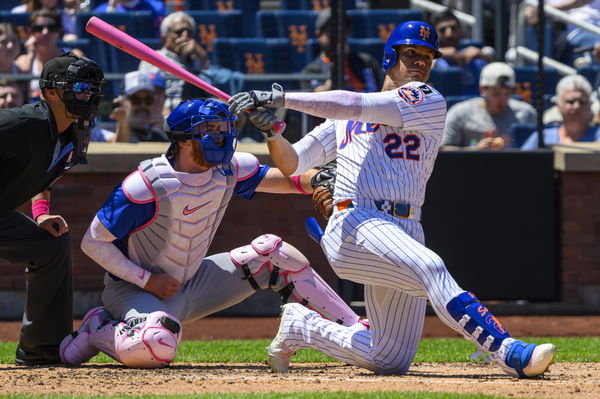
Imago
Image: MLB.com

Imago
Image: MLB.com
On most days, Mets fans dream about Juan Soto anchoring the lineup for the next decade and a half, launching baseballs into Citi Field’s second deck while the crowd roars. He’s not just a right fielder in New York, he’s the franchise’s statement piece, proof that Steve Cohen’s Mets are willing to spend whatever it takes to win. But in one corner of the baseball world this week, that dream met a jarring dose of front-office realism.
Watch What’s Trending Now!
It came during an episode of Nothing Personal with David Samson, when the former Marlins president was asked how MLB teams might protect their rosters in the event of an expansion draft. Expansion talk has been bubbling with cities like Nashville and Montreal floated as possibilities, but Samson didn’t waste time on civic pitches. Instead, he went straight for a scenario that would make Queens do a double-take.
“Would you think the Mets would protect Juan Soto in an expansion draft? No way, Jose,” said Samson. “You’d love an expansion team to take Juan Soto, take him, take the money, great, no problem.”

Imago
May 11, 2025, Queens, New York, USA: Juan Soto, 22 of the New York Mets flys out during MLB, Baseball Herren, USA game Chicago Cubs at NY Metes at Citi Field Queens USA – ZUMAc268 20250511_zsp_c268_010 Copyright: xJamesxPatrickxCooperx
From there, Samson laid out the cold logic that drives expansion-draft strategy. You don’t shield the high-priced veterans, no matter how beloved they are. You protect your No. 1 prospect, your budding stars still years away from free agency, and any young talent producing at the big-league level. “Don’t take away my young guy with six years of control,” Samson added, making clear where his priorities would fall if he were still in a front office.
The approach might appear ruthless, but history backs him up. In the 1997 expansion draft, every team got just 15 protection slots, meaning notable names and fan favorites were left exposed. If MLB follows a similar format in the future, a $765 million contract like Soto’s could become a tempting “free” opportunity for a new franchise, especially if it meant wiping that commitment from the books.
For Mets fans, the notion of leaving Soto unprotected is almost sacrilegious. Yet Samson’s take serves as a reminder: in the high-stakes world of roster construction, emotion takes a back seat to economics. Expansion may still be years away, but the conversation it’s sparking now shows just how quickly the business side of baseball can flip the script, even for the biggest stars in the game.
Expansion’s ripple effect on stars like Juan Soto
When MLB last expanded in 1997, the process blindsided more than a few established players. Teams were limited to protecting just 15 players on their rosters, forcing executives to make ruthless decisions. Future All-Star Bobby Abreu, for instance, was left unprotected by the Astros and promptly snapped up by the Tampa Bay Devil Rays, before being flipped to the Phillies, where he became a franchise cornerstone. The rules didn’t care about name recognition; they rewarded youth, cost control, and upside over star power on big contracts.
If MLB greenlights expansion to cities like Nashville or Vancouver, the same logic will apply, perhaps even more intensely in today’s megadeal era. Front offices would be reluctant to burn a protection slot on a player like Soto, Mike Trout, or even Mookie Betts if their contracts stretch deep into the future with massive annual salaries. In 1997, the Rockies left pitcher Kevin Ritz, fresh off a 17-win season, was unprotected because his peak years were already costly. The calculus was simple: protect the players who could give you six or more cheap, productive years.
That ripple effect wouldn’t just touch stars in their 30s. Even players in their prime could be exposed if their salaries were seen as inflexible or if the team’s competitive window shifted. Think of Nolan Arenado’s trade from Colorado in 2021, not an expansion move, but a telling example of how franchises sometimes value payroll flexibility over an elite player’s on-field impact. In an expansion draft, that same mindset could make marquee names vulnerable, not because they can’t perform, but because a clean slate of financial breathing room can be just as valuable as a 40-homer bat.







